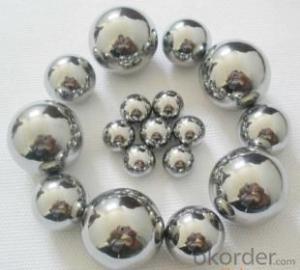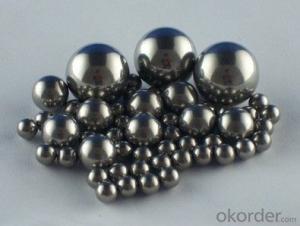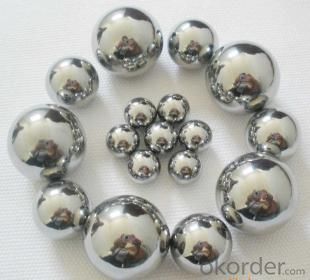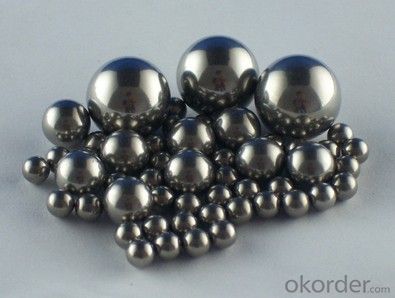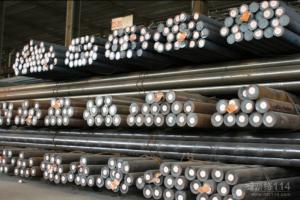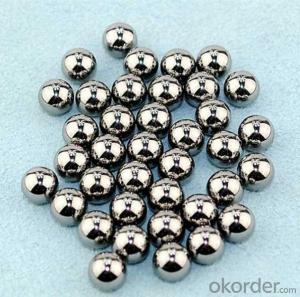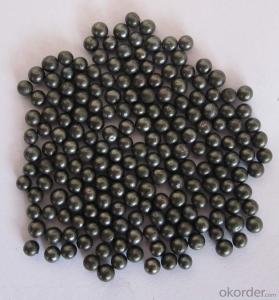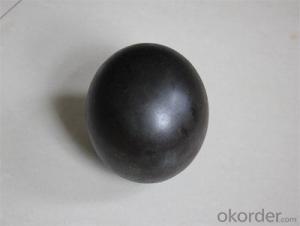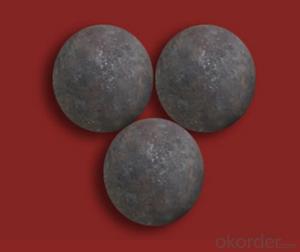Ball bearing steel balls
- Loading Port:
- China Main Port
- Payment Terms:
- TT OR LC
- Min Order Qty:
- -
- Supply Capability:
- -
OKorder Service Pledge
OKorder Financial Service
You Might Also Like
Quick Details
| Place of Origin: | Brand Name: | Model Number: | |||
| Material: | grade: | diameter: | |||
| certificate: | standard: | AISI: | |||
| feature: | stock: | sample: | |||
| leadtime: |
Packaging & Delivery
| Packaging Detail: | 3.5mm ball bearing steel balls 1.international standard package(carton, wooden box or pipe packing) 2.as customer's requireme |
| Delivery Detail: | 2~15days,if we have items in stock ,the leadtime will be 1day |
Specifications
Factory Cost 20mm steel ball
1.material: AISI304/316/440B/410/420B/201
2.grade:G10-G1000
3.Hardness:60-65HRC
4.sample:free
Product Name3.5mm ball bearing steel ballsServiceYour inquiry will be replied within 12 hours.
BrandCNBMMaterialStainless, carbon, chrome, aluminum, copper, precious metal plated , glass, plastic ball and etc.Size0.5mm-50.8mm
FeatureHigh polished, strong antiwear, high precision, easy storage.
Antirust WayProvide dry packaging & slushing oil packaging.GradeG10-G1000
HardnessHRC 58-62 (If you have special requirements, please tell us.)
SampleFree
StockThere are emergency stocks for regular sizes.
StandardGB/T308-2002, ISO3290:2001, ANSI/ASME Std. 10A-2001, DIN5401
Packing MethodStandard Seaworthy Export Packing or Customized Packing
Payment TermT/T, L/C, Western Union,
Delivery TimeWithin 2-15 days according to your required size & quantity.Using Range
Bicycles, Motor, Machinery, ElectricTools, Sports Apparatus, Medical Equipment, Chemicals, Aviation, Perfume Bottles, Sprayers, Valves, Nail Polish, Body Jewelry, Mobile Phone Panels, Toys and etc.
- Q: What are the different methods of improving the creep resistance of special steel?
- There are several methods for improving the creep resistance of special steel. One approach is through alloying, where specific elements such as chromium, molybdenum, and tungsten are added to enhance the steel's creep resistance. Another method involves heat treatment processes such as annealing or quenching and tempering, which can refine the microstructure and increase the steel's resistance to creep deformation. Surface treatments like carburizing or nitriding can also be employed to improve the creep resistance of special steel. Furthermore, controlling the grain size and texture through techniques like grain refinement or grain boundary engineering can enhance the steel's resistance to creep. Finally, proper design considerations, such as reducing stress concentrations and optimizing component geometry, can also contribute to improving the creep resistance of special steel.
- Q: Can special steel be used in the construction industry?
- Yes, special steel can be used in the construction industry. It offers several advantages such as high strength, durability, and resistance to corrosion, making it suitable for various applications in construction, including beams, columns, and reinforced concrete structures. Special steel can also provide cost-effective solutions by reducing the need for additional materials and maintenance.
- Q: What are the different stamping grades of special steel?
- There are several different stamping grades of special steel used in various industries. Some of the common stamping grades include: 1. Low Carbon Steel: This grade of special steel is known for its excellent formability and weldability. It is often used in applications that require deep drawing or complex bending. Low carbon steel is also cost-effective and widely available, making it a popular choice in stamping processes. 2. High Strength Low Alloy (HSLA) Steel: HSLA steel is a type of special steel that contains small amounts of alloying elements such as copper, nickel, or chromium. This grade offers higher strength and better toughness compared to low carbon steel. It is commonly used in automotive components, structural parts, and other applications that require strength and durability. 3. Stainless Steel: Stainless steel is a corrosion-resistant special steel that contains a minimum of 10.5% chromium. It is commonly used in stamping applications that demand resistance to rust, staining, and corrosion. Stainless steel comes in various grades, such as 304, 316, and 430, each offering different levels of corrosion resistance and mechanical properties. 4. Tool Steel: Tool steel is a high-quality special steel designed for applications that require resistance to wear, deformation, and high temperatures. It is commonly used in stamping dies, cutting tools, and other applications where hardness and toughness are crucial. Tool steel grades include D2, A2, O1, and M2, among others. 5. Electrical Steel: Electrical steel, also known as silicon steel, is a special grade that has high magnetic permeability and low electrical conductivity. It is used in stamping applications that require efficient magnetic properties, such as transformers, motors, and generators. These are just a few examples of stamping grades of special steel. Each grade is chosen based on the specific requirements of the application, such as strength, corrosion resistance, magnetic properties, or formability.
- Q: What are the different methods of preventing hydrogen embrittlement in special steel?
- There are several methods that can be employed to prevent hydrogen embrittlement in special steel. These include proper material selection, such as using low-hydrogen alloys or stainless steel grades that are less susceptible to embrittlement. Additionally, controlling the environment during manufacturing and storage processes is crucial, as hydrogen absorption can occur during these stages. Other preventive measures include heat treatment processes like stress relieving and tempering, which can help reduce internal stresses and enhance the steel's resistance to embrittlement. Overall, a combination of careful material selection, controlled environments, and appropriate heat treatment techniques can effectively prevent hydrogen embrittlement in special steel.
- Q: How is special steel used in the power generation industry?
- Special steel is widely used in the power generation industry for various applications. It is utilized in the manufacturing of turbines, boilers, and other critical components due to its exceptional strength, heat resistance, and corrosion resistance properties. Special steel is crucial in ensuring the efficiency and reliability of power plants, enabling them to withstand high temperatures and pressures, while also minimizing downtime and maintenance costs.
- Q: What are the common challenges in heat treatment of special steel?
- To achieve the desired material properties, careful attention must be given to several challenges encountered in the heat treatment of special steel. One primary challenge revolves around the necessity for meticulous temperature control throughout the heating and cooling stages. Special steels typically have specific temperature ranges for heat treatment that must be strictly adhered to in order to attain the desired microstructure and mechanical properties. Failing to maintain precise temperature control can result in inadequate or inconsistent heat treatment, ultimately leading to suboptimal material performance. Another challenge lies in the potential distortion or warping of the steel components during the heat treatment process. Special steels often possess intricate designs or complex shapes, making them more susceptible to distortion when subjected to high temperatures. This distortion can have adverse effects on the overall quality and dimensional accuracy of the final product. Consequently, careful consideration must be given to the selection of suitable heating and cooling methods, as well as the utilization of fixtures or jigs to minimize distortion. Moreover, special steels may contain alloying elements that significantly influence the heat treatment process. Elements like chromium, molybdenum, or vanadium can alter the steel's hardenability, tempering response, or transformation behavior. Their presence can introduce additional challenges when determining the optimal heat treatment parameters, necessitating adjustments to heating and cooling rates, soak times, or quenching media. Lastly, achieving uniformity in heat treatment across a batch of special steel components can prove to be challenging. Variations in size, shape, or composition within a batch can result in inconsistent heat treatment outcomes. Controlling the heating and cooling rates, ensuring proper circulation of the heat treatment media, and implementing effective process monitoring techniques are essential in achieving consistent and uniform material properties. In conclusion, the heat treatment of special steel encompasses challenges such as precise temperature control, distortion/warping, the influence of alloying elements, and achieving uniformity across a batch. Successfully addressing these challenges requires a comprehensive understanding of the steel's composition, meticulous process planning, and the utilization of appropriate process controls and monitoring techniques.
- Q: Can special steel be used in the medical industry?
- Yes, special steel can be used in the medical industry. Special steel alloys, such as stainless steel, are commonly used in medical devices, surgical instruments, and implants due to their excellent corrosion resistance, biocompatibility, and sterilization capabilities. These qualities make special steel a reliable and safe choice for various medical applications.
- Q: How does special steel contribute to the power transmission sector?
- Special steel plays a crucial role in the power transmission sector due to its exceptional properties and performance characteristics. Firstly, special steel is known for its high strength and resilience, which makes it an ideal material for manufacturing various components of power transmission systems. For instance, special steel is widely used in the production of transmission towers, where its strength ensures the stability and durability of the structures, even under extreme weather conditions. Moreover, special steel is highly resistant to corrosion, which is particularly beneficial in the power transmission sector. Power transmission equipment is often exposed to harsh environments, such as high humidity, chemical pollutants, and saltwater exposure, which can accelerate corrosion. By utilizing special steel in the manufacturing process, the risk of corrosion-related failures is significantly minimized, ensuring the reliable and uninterrupted transmission of power. Additionally, special steel offers excellent electrical conductivity, making it an ideal choice for conductors and cables used in power transmission. The efficient transfer of electrical energy is crucial to minimize power losses and optimize the transmission process. Special steel conductors provide low resistance to the flow of electricity, enabling efficient power transmission over long distances. Furthermore, special steel is also utilized in the production of transformers and other electrical equipment used in power transmission. The magnetic properties of special steel make it an excellent material for transformer cores, enabling efficient energy conversion and minimizing energy losses during transmission. In conclusion, special steel contributes significantly to the power transmission sector by offering strength, corrosion resistance, electrical conductivity, and magnetic properties. These properties ensure the reliability, efficiency, and longevity of power transmission systems, ultimately supporting the uninterrupted supply of electricity to industries, businesses, and households.
- Q: How does the demand for special steel vary across different regions?
- The demand for special steel can vary significantly across different regions due to several factors. One of the key drivers of demand variation is the level of industrialization in a particular region. Developed regions with a strong manufacturing sector, such as North America, Europe, and East Asia, tend to have a higher demand for special steel as they rely heavily on it for various industrial applications. Another factor that influences demand variation is the presence of specific industries or sectors within a region. For example, regions with a significant automotive or aerospace industry will have a higher demand for special steel as these sectors require high-performance materials for the production of vehicles or aircraft. Moreover, the construction industry plays a crucial role in determining the demand for special steel. Regions experiencing rapid urbanization and infrastructure development, like Southeast Asia, the Middle East, and parts of Africa, have an increased demand for special steel for the construction of buildings, bridges, and other infrastructure projects. Additionally, the availability of raw materials and production capabilities within a region can affect the demand for special steel. Regions with ample access to iron ore, coal, and other necessary resources for steel production may have a higher demand for special steel as they can efficiently produce it. Lastly, economic trends and government policies also impact the demand for special steel. Regions with stable economic growth and favorable policies for industries that use special steel will likely experience higher demand. Conversely, regions facing economic downturns or restrictive trade policies may witness a decline in demand. In conclusion, the demand for special steel varies across different regions due to factors such as industrialization levels, specific industries present, construction activities, availability of raw materials, and economic trends. Understanding these variations is essential for steel manufacturers and suppliers to effectively target and cater to the diverse needs of different regions.
- Q: What are the different methods of surface powder coating for special steel?
- Some different methods of surface powder coating for special steel include electrostatic spraying, fluidized bed coating, and flame spraying. Electrostatic spraying involves applying a charged powder to the steel surface, which is then cured in an oven. Fluidized bed coating involves dipping the steel into a bed of powder that is heated to a fluidized state, allowing the powder to adhere to the surface. Flame spraying uses a flame to melt and propel the powder onto the steel surface, creating a durable coating.
Send your message to us
Ball bearing steel balls
- Loading Port:
- China Main Port
- Payment Terms:
- TT OR LC
- Min Order Qty:
- -
- Supply Capability:
- -
OKorder Service Pledge
OKorder Financial Service
Similar products
Hot products
Hot Searches
Related keywords
